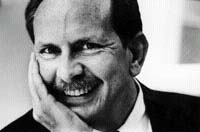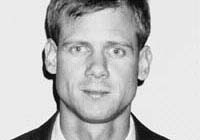 |


Under corporate ownership, the Washington Blade has lost its edge |
|
By Brian Montopoli Courtesy of the Washington City Paper
At the new Washington Blade, however, local photographers just don't matter as much. These days, the paper's pages spill over with the same promo shots and Associated Press photos that fill the pages of Window's gay newspapers around the country. Founded in 1969 in response to the Stonewall riots, the Blade eventually emerged as "the gay newspaper of record" -- a hard-news publication that served a neglected gay and lesbian community's thirst for information. But a year removed from the sale of the paper to Window Media, the nation's largest gay-and-lesbian newspaper conglomerate, the Blade has become something closer to a gay Gannett paper. Celebrity news has become front-page fare, local coverage is suffering from a lack of reporters, and many of the longtime staffers who made the Blade a gay-news powerhouse are jumping ship, complaining that the paper has become a homogenized product that reflects the triumph of corporate synergy over hard-news content. The Blade's Slim-Fast regime was conceived to satisfy its new owner's push for quick profits. Window Media in May 2001 bought the Blade and its sister publication, the New York Blade News, adding to its existing portfolio of five gay newspapers and magazines. At the time of the purchase, Window was having problems with some of its investors. "We had frustrations about not having the financials shared with us," says Michael Aycock, one of four investors who filed suit against the company. Window eventually resolved the complaints of its investors, but it ultimately turned to other sources to finance the purchase of the Blade. The company took out a $1 million loan from Silicon Valley Bank and turned to Avalon Equity Partners, a New York venture-capital firm that owns a majority stake in Window Media, for most of the rest of the money. (The parties refused to disclose the amount of the Avalon financing.) The deal went down at a time when other news outlets were shedding assets and bemoaning the country's ad recession -- an odd environment in which to saddle one's company with debt. "They were talking as if they were a dot-com company back [in the '90s]," says a source familiar with the deal. "It was like a time machine. The New York Blade was a money-loser, and it was a bad time for media in general. But they were talking about 20 percent growth, and [company President William Waybourn] was actually bragging about the loan, as if it was a good thing. They were just delusional in their expectations." Companywide austerity followed its debt play for the Blade. First, Window closed its struggling newspaper in New Orleans, citing a downturn in ad revenues. It also began cutting much of the editorial staff of its other papers, including the Blade. Because one reporter could write a story that would run in all of the publications, the owners were able to downsize editorial departments nationwide and decrease the pay for freelancers. The move came on the heels of other gay-media mergers. "The consolidation meant that very few people get to set the spin on national stories," says gay activist Bill Dobbs. "There is a homogenization taking place in gay news. We need to see more voices." The new corporate ownership also gave the paper a face-lift, a move it hoped would broaden readership and justify an increase in advertising rates. No longer does the Blade carry the banner "Serving the nation's capital since 1969." Instead, the paper has grown more, as the new owners put it, "reader-friendly": Now it's "All the news for your life. And your style." (According to Waybourn, circulation has increased.)
But the new approach has not gone over well with longtime staffers. Since the sale, four of the newspaper's 10 writers and editors have left or been fired, and none have been replaced. (The paper is said to be looking to fill one or two of those positions.) Pocketbook considerations may have played a role in the desertion. Former photo editor Clint Steib and others point to a litany of problems: a period when health-care benefits were suspended, significant lag times for checks to be paid, and anti-union activities. (Crain denies that there have been financial problems and says the union issue was settled amicably.) The large number of resignations since the sale is typical, says Crain. "It's not uncommon for there to be significant turnover when a paper is bought and sold," he says. But in this case, says Steib, the turnover stems from philosophical, not transitional, issues. "The Blade was a community-based newspaper, and Window Media moved it away from that community base," he says. Steib adds that having writers from other cities help fill the pages of the Washington paper has corrupted its identity: "They're going into local gay communities and buying up all the papers, and it's sad, because the quality has gone way down. The Blade was very well-respected in both gay and mainstream media, and you just can't say that anymore."
"I don't think the Russell Crowe or Rosie story would have been done in the old Blade," says Crain, "but we live in a celebrity-driven culture. The Blade is still the paper of record for the gay civil rights movement -- we're just trying to increase the balance so that we cover all aspects of our readers' lives." That comprehensiveness comes at a cost, says former editor Kristina Campbell. "There has been an effort to broaden the appeal of the paper and make it less political," says Campbell, who had been at the Blade for nine years before she left, in March. "There were weeks I needed to make adjustments for arts and entertainment content -- there just wasn't as much space for news stories. Not to begrudge the new feature coverage, but what we were doing before was very news-focused, so it's different." In October, Window came up with the idea to insert an "auto guide" into the paper and fill it with advertising from car dealerships. The guide included articles on what gay people need to know to buy cars, as well as profiles of gay car owners. One story pointed out that "[r]egardless of sexual orientation, everyone has a certain affinity for his or her car." Crain defends the notion of tying ad sales to content, a tack mastered by most major newspapers in their automotive and home sections. But staffers were beginning to get fed up. "It was advertising disguised as news," says former Arts Editor Greg Varner. "That kind of stuff never would have happened before Window Media came along." That's undeniable. What would have happened before Window is that the paper would have published its standard roster of dry, wonky pieces on gay politics and neighborhood disputes. Crain says the changes come out of an honest attempt to have the newspaper reflect changing tastes and broaden readership -- not an attempt to destroy an authentic gay outlet. "We believe in the gay press, because it's an engine for social change," says Crain. "We're covering a civil rights movement. We may have lost some of that 'pop-and-pop' feel, but we're trying to reflect the balance in our readers' lives. Things have changed." But Window Media is trying to do the impossible: cut costs and increase revenues without harming quality -- at a time when many newspapers are struggling just to break even. Something has to give, and it appears that the editors have decided to abandon the idealized notion of a smart, newsy, independent Blade that serves as an outlet for gay thoughts and dispenses with the fluff.
Washington City Paper 'Blade Runners' by Brian Montopoli Washington Blade |
 Window Media President William Waybourn
Window Media President William Waybourn  Window Media Editorial Director Chris Crain
Window Media Editorial Director Chris Crain  A recent cover story on Rosie O'Donnell shows, critics says, the shift in the Blade's coverage
A recent cover story on Rosie O'Donnell shows, critics says, the shift in the Blade's coverage  Prof. Rodger Streitmatter
Prof. Rodger Streitmatter 